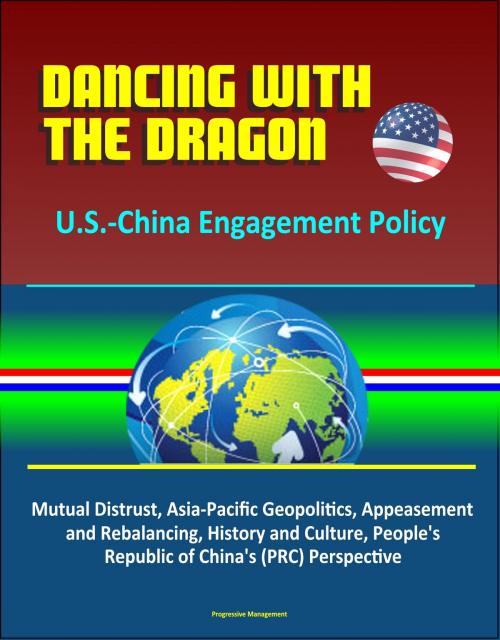Dancing with the Dragon: U.S.-China Engagement Policy - Mutual Distrust, Asia-Pacific Geopolitics, Appeasement and Rebalancing, History and Culture, People's Republic of China's (PRC) Perspective
Nonfiction, History, Asian, China, Military, United States| Author: | Progressive Management | ISBN: | 9781310960178 |
| Publisher: | Progressive Management | Publication: | May 27, 2016 |
| Imprint: | Smashwords Edition | Language: | English |
| Author: | Progressive Management |
| ISBN: | 9781310960178 |
| Publisher: | Progressive Management |
| Publication: | May 27, 2016 |
| Imprint: | Smashwords Edition |
| Language: | English |
This excellent report has been professionally converted for accurate flowing-text e-book format reproduction. This paper analyzes the effectiveness of the current U.S. engagement policy with China that has been implemented since 1972. Is the engagement policy an appeasement policy? Is China's rise causing the downfall of the United States? Is this a zero-sum game or does it provide a win-win solution for both sides? The analysis offers historical, cultural, political, and economic perspectives from both the U.S. and China's point of view. The current friction points between the two countries are considered in their political, historical, economic, and military environments. This paper considers whether the current engagement policy sufficiently mitigates the mutual distrust between the U.S. and China. It then concludes with strategic recommendations to strengthen the current U.S. engagement policy with China and offer new opportunities to enhance Asia-Pacific geopolitics.
In November 2011, President Obama made an explicit and direct policy statement during his visit to Australia: "As President, therefore, I have made a deliberate and strategic decision—as a Pacific nation, the United States will play a larger and long-term role in shaping this region and its future, by upholding core principles and in close partnership with our allies and friends." After the end of the Vietnam War in 1975 and the ensuing decades of involvement in the Middle East region, including protracted wars in Iraq and Afghanistan, U.S. leaders have decided to pivot their priority and resources to the Asia-Pacific region. According to Deputy Secretary of Defense Ashton Carter, this re-focused strategy to the Asia-Pacific is not about China or the U.S. Rather, it is all about the most important and prominent region in the 21st century in which many countries have been enjoying the benefit of security and prosperity for over 60 years since the end of World War II (WWII). The rising economies of the so-called "Four Little Dragons" - Hong Kong, Singapore, Taiwan, and South Korea - provide a text-book example of the U.S. security involvement and contribution to the region's economic stability and prosperity. However, from the People's Republic of China's (PRC) perspective, this rebalancing strategy is a direct U.S. attempt to contain or isolate China.
China believes that the U.S. wants to protect its hegemonic position and prevent China from becoming an Asian regional power in which the United States has dominated since the end of WWII. The island disputes in the South China Sea and East China Sea have generated friction between China and neighboring countries. China has criticized the United States for siding with other nations against China's territorial claims.
This excellent report has been professionally converted for accurate flowing-text e-book format reproduction. This paper analyzes the effectiveness of the current U.S. engagement policy with China that has been implemented since 1972. Is the engagement policy an appeasement policy? Is China's rise causing the downfall of the United States? Is this a zero-sum game or does it provide a win-win solution for both sides? The analysis offers historical, cultural, political, and economic perspectives from both the U.S. and China's point of view. The current friction points between the two countries are considered in their political, historical, economic, and military environments. This paper considers whether the current engagement policy sufficiently mitigates the mutual distrust between the U.S. and China. It then concludes with strategic recommendations to strengthen the current U.S. engagement policy with China and offer new opportunities to enhance Asia-Pacific geopolitics.
In November 2011, President Obama made an explicit and direct policy statement during his visit to Australia: "As President, therefore, I have made a deliberate and strategic decision—as a Pacific nation, the United States will play a larger and long-term role in shaping this region and its future, by upholding core principles and in close partnership with our allies and friends." After the end of the Vietnam War in 1975 and the ensuing decades of involvement in the Middle East region, including protracted wars in Iraq and Afghanistan, U.S. leaders have decided to pivot their priority and resources to the Asia-Pacific region. According to Deputy Secretary of Defense Ashton Carter, this re-focused strategy to the Asia-Pacific is not about China or the U.S. Rather, it is all about the most important and prominent region in the 21st century in which many countries have been enjoying the benefit of security and prosperity for over 60 years since the end of World War II (WWII). The rising economies of the so-called "Four Little Dragons" - Hong Kong, Singapore, Taiwan, and South Korea - provide a text-book example of the U.S. security involvement and contribution to the region's economic stability and prosperity. However, from the People's Republic of China's (PRC) perspective, this rebalancing strategy is a direct U.S. attempt to contain or isolate China.
China believes that the U.S. wants to protect its hegemonic position and prevent China from becoming an Asian regional power in which the United States has dominated since the end of WWII. The island disputes in the South China Sea and East China Sea have generated friction between China and neighboring countries. China has criticized the United States for siding with other nations against China's territorial claims.















